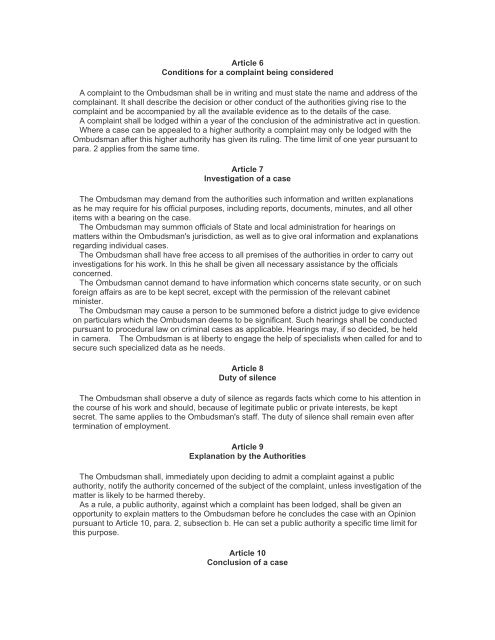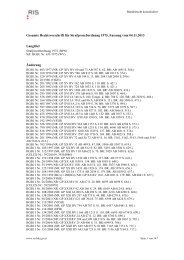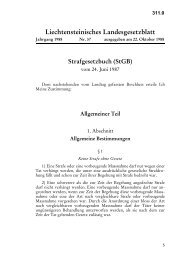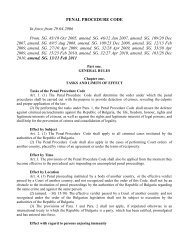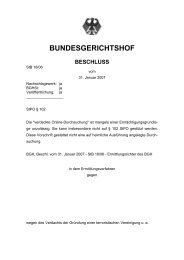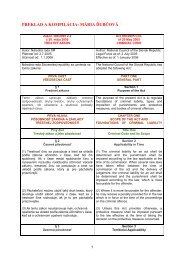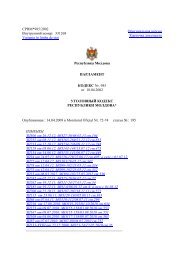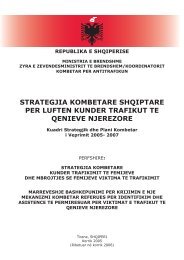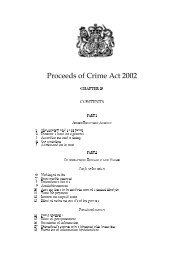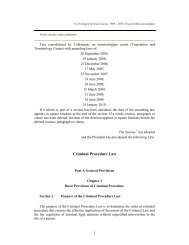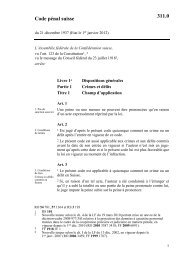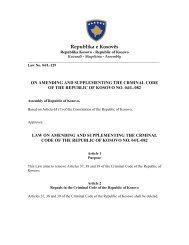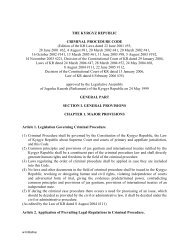Act No. 85/1997 on the Althing Ombudsman - Legislationline
Act No. 85/1997 on the Althing Ombudsman - Legislationline
Act No. 85/1997 on the Althing Ombudsman - Legislationline
Create successful ePaper yourself
Turn your PDF publications into a flip-book with our unique Google optimized e-Paper software.
Article 6<br />
C<strong>on</strong>diti<strong>on</strong>s for a complaint being c<strong>on</strong>sidered<br />
A complaint to <strong>the</strong> <strong>Ombudsman</strong> shall be in writing and must state <strong>the</strong> name and address of <strong>the</strong><br />
complainant. It shall describe <strong>the</strong> decisi<strong>on</strong> or o<strong>the</strong>r c<strong>on</strong>duct of <strong>the</strong> authorities giving rise to <strong>the</strong><br />
complaint and be accompanied by all <strong>the</strong> available evidence as to <strong>the</strong> details of <strong>the</strong> case.<br />
A complaint shall be lodged within a year of <strong>the</strong> c<strong>on</strong>clusi<strong>on</strong> of <strong>the</strong> administrative act in questi<strong>on</strong>.<br />
Where a case can be appealed to a higher authority a complaint may <strong>on</strong>ly be lodged with <strong>the</strong><br />
<strong>Ombudsman</strong> after this higher authority has given its ruling. The time limit of <strong>on</strong>e year pursuant to<br />
para. 2 applies from <strong>the</strong> same time.<br />
Article 7<br />
Investigati<strong>on</strong> of a case<br />
The <strong>Ombudsman</strong> may demand from <strong>the</strong> authorities such informati<strong>on</strong> and written explanati<strong>on</strong>s<br />
as he may require for his official purposes, including reports, documents, minutes, and all o<strong>the</strong>r<br />
items with a bearing <strong>on</strong> <strong>the</strong> case.<br />
The <strong>Ombudsman</strong> may summ<strong>on</strong> officials of State and local administrati<strong>on</strong> for hearings <strong>on</strong><br />
matters within <strong>the</strong> <strong>Ombudsman</strong>'s jurisdicti<strong>on</strong>, as well as to give oral informati<strong>on</strong> and explanati<strong>on</strong>s<br />
regarding individual cases.<br />
The <strong>Ombudsman</strong> shall have free access to all premises of <strong>the</strong> authorities in order to carry out<br />
investigati<strong>on</strong>s for his work. In this he shall be given all necessary assistance by <strong>the</strong> officials<br />
c<strong>on</strong>cerned.<br />
The <strong>Ombudsman</strong> cannot demand to have informati<strong>on</strong> which c<strong>on</strong>cerns state security, or <strong>on</strong> such<br />
foreign affairs as are to be kept secret, except with <strong>the</strong> permissi<strong>on</strong> of <strong>the</strong> relevant cabinet<br />
minister.<br />
The <strong>Ombudsman</strong> may cause a pers<strong>on</strong> to be summ<strong>on</strong>ed before a district judge to give evidence<br />
<strong>on</strong> particulars which <strong>the</strong> <strong>Ombudsman</strong> deems to be significant. Such hearings shall be c<strong>on</strong>ducted<br />
pursuant to procedural law <strong>on</strong> criminal cases as applicable. Hearings may, if so decided, be held<br />
in camera. The <strong>Ombudsman</strong> is at liberty to engage <strong>the</strong> help of specialists when called for and to<br />
secure such specialized data as he needs.<br />
Article 8<br />
Duty of silence<br />
The <strong>Ombudsman</strong> shall observe a duty of silence as regards facts which come to his attenti<strong>on</strong> in<br />
<strong>the</strong> course of his work and should, because of legitimate public or private interests, be kept<br />
secret. The same applies to <strong>the</strong> <strong>Ombudsman</strong>'s staff. The duty of silence shall remain even after<br />
terminati<strong>on</strong> of employment.<br />
Article 9<br />
Explanati<strong>on</strong> by <strong>the</strong> Authorities<br />
The <strong>Ombudsman</strong> shall, immediately up<strong>on</strong> deciding to admit a complaint against a public<br />
authority, notify <strong>the</strong> authority c<strong>on</strong>cerned of <strong>the</strong> subject of <strong>the</strong> complaint, unless investigati<strong>on</strong> of <strong>the</strong><br />
matter is likely to be harmed <strong>the</strong>reby.<br />
As a rule, a public authority, against which a complaint has been lodged, shall be given an<br />
opportunity to explain matters to <strong>the</strong> <strong>Ombudsman</strong> before he c<strong>on</strong>cludes <strong>the</strong> case with an Opini<strong>on</strong><br />
pursuant to Article 10, para. 2, subsecti<strong>on</strong> b. He can set a public authority a specific time limit for<br />
this purpose.<br />
Article 10<br />
C<strong>on</strong>clusi<strong>on</strong> of a case


